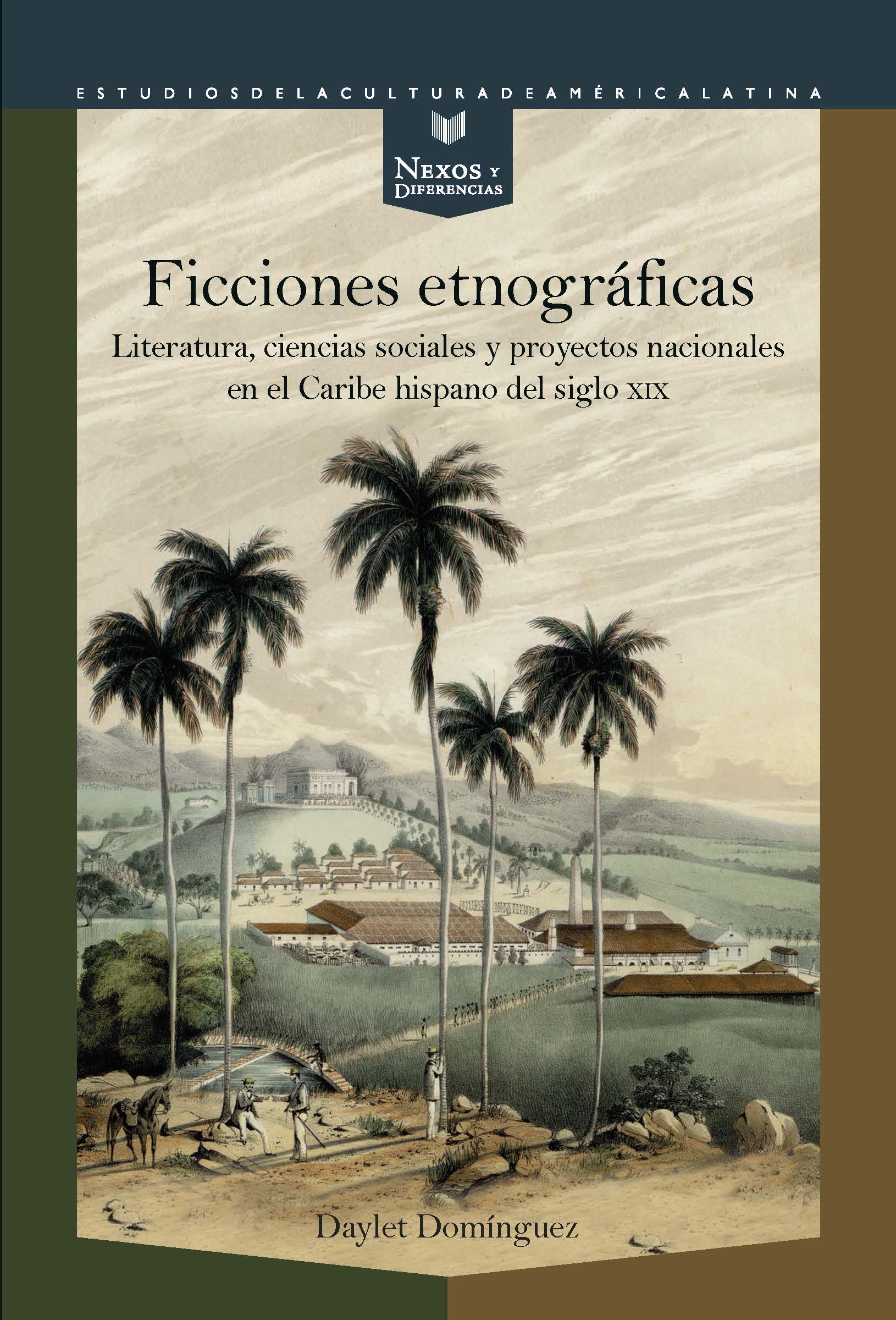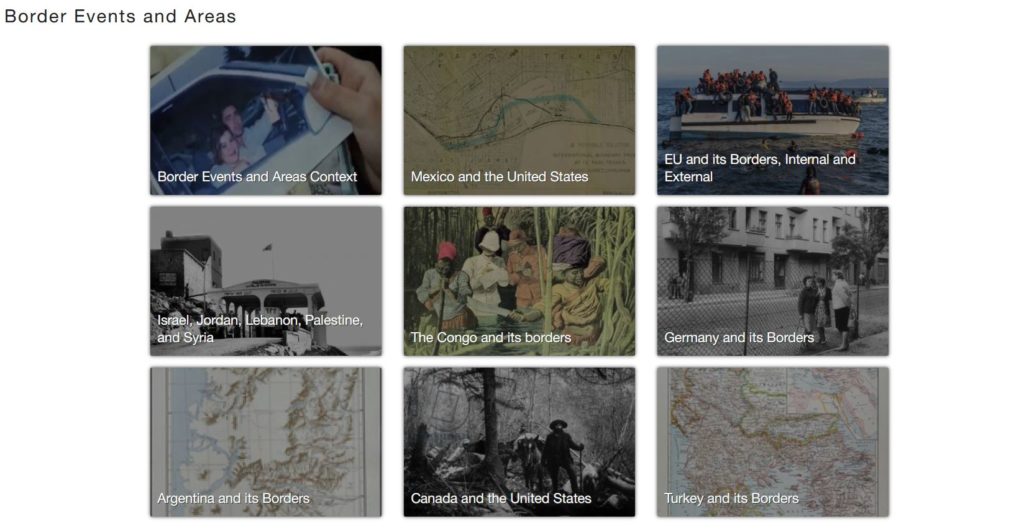Tag: Latin American Studies
Library purchases digital archive of Prensa Libre (Guatemalan Newspaper): 1951-2024
UC Berkeley Library has purchased ongoing access to Prensa Libre Digital Archive (1951-2024). Prensa Libre is a well-respected Spanish-language Guatemalan Newspaper. It began publishing in 1951, and since then has provided extensive coverage of politics, news, social conditions, history, governance issues, Garífuna, Mayan, and other indigenous communities (Pueblos Originarios en Guatemala), and civil war(s) in Guatemala and Central America.
We hope that this newspaper resource will be of great use to our faculty and students who study Anthropology, Politics Social Sciences, History of Central America, and Latin America.
Prensa Libre digital archive can be accessed from off-campus locations using the proxy or VPN here.
Below is the screenshot of the landing page of the archive. It has a robust search interface.
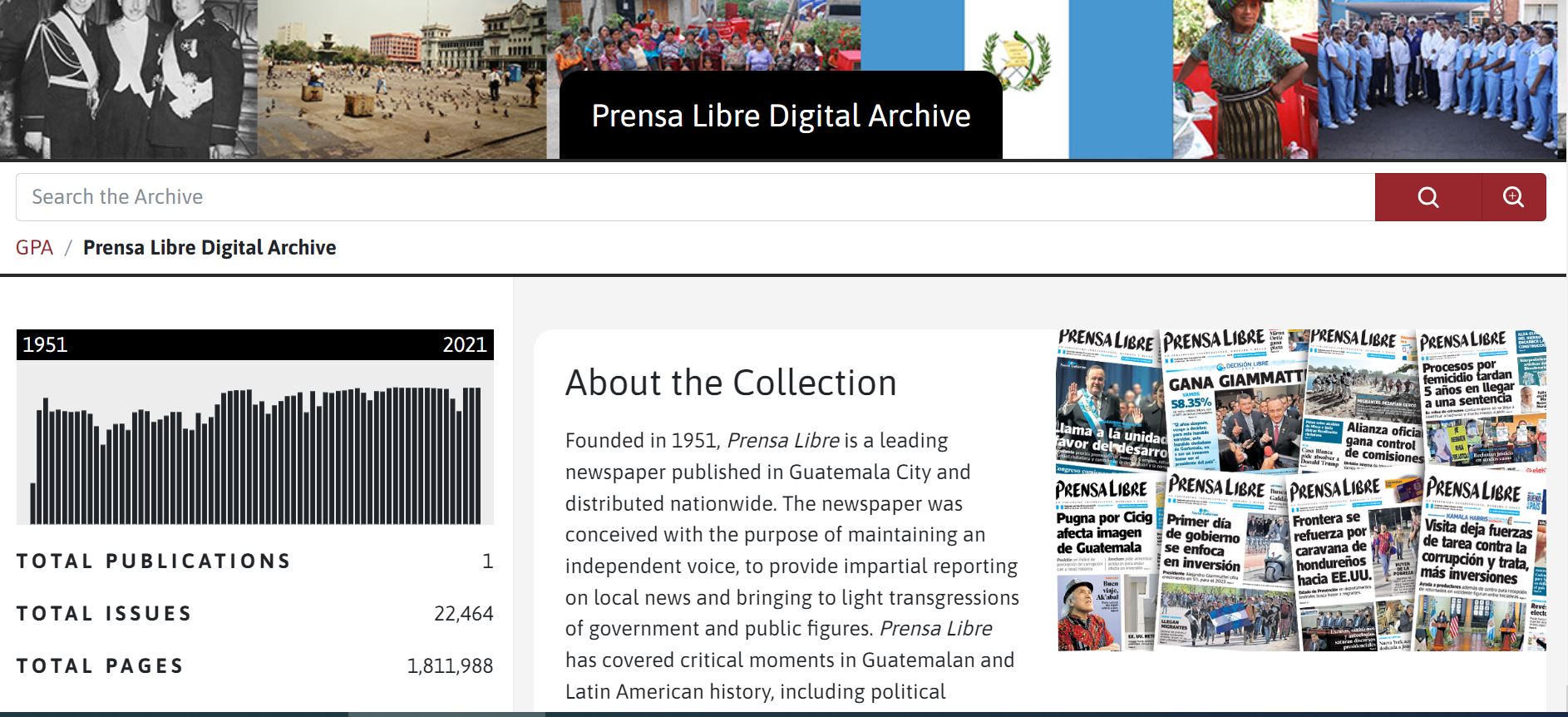
SIGLA: States and Institutions of Governance in Latin America Database
SIGLA (States and Institutions of Governance in Latin America, www.sigladata.org) is a multilingual digital database that freely provides information on legal and political institutions in Latin America. The beta version of SIGLA offers data on national-level institutions in Brazil, Colombia, and Mexico, as well as on international institutions. Ultimately, SIGLA will provide cross-nationally comparable, current and historical, qualitative and quantitative data on over 50 legal and political institutions in 20 Latin American countries in English, Spanish, and Portuguese.
Trial of Brill’s Revolución y Cultura, 1961–2003 (ending February 21, 2023)
Revolución y Cultura, 1961–2003(Cuba)
Please access the trial through February 21, 2023, here
At UC Berkeley Library, we have several individual issues of Revolución y Cultura, however, Brill has produced a complete digitized archive of it that is searchable. We have set up a trial of this resource through February 21, 2023. We look forward to hearing your comments regarding the utility of this resource in your teaching and research. Please feel free to contact your librarian for the Caribbean and Latin American Studies here.
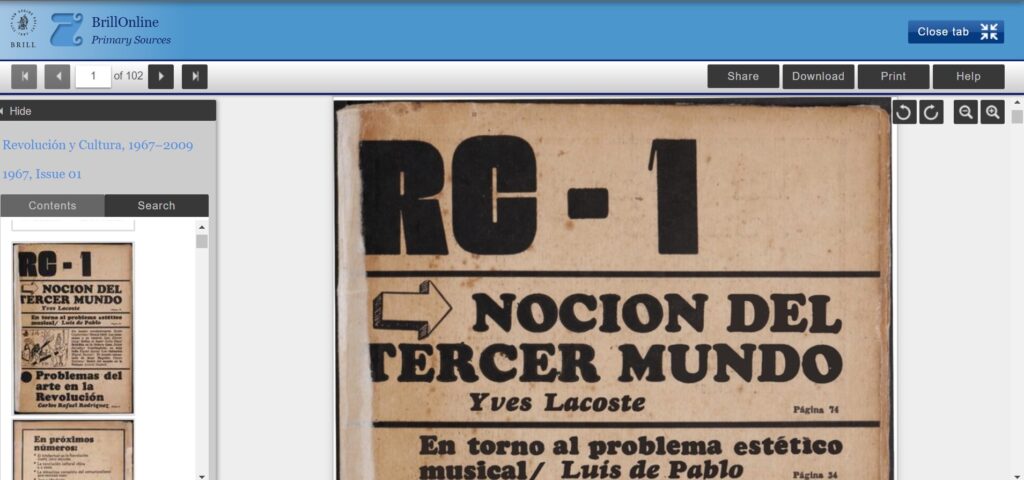
About:
Revolución y Cultura is a fundamental and often unique resource for the study of more than half a century of Cuban culture. Founded as a biweekly in 1961 under the title Pueblo y Cultura and continued in 1965 as the bilingual magazine Revolution et/and Culture and as RC in 1967, Revolución y Cultura has published uninterruptedly since March 1972. From its foundation until 1977, when the Cuban Ministry of Culture was created, it appeared as the official organ of Cuba’s National Council of Culture.
From 2004 to 2019 it was published both in print and electronically. Since mid-2019, Revolución y Cultura is published online only. Revolución y Cultura is listed in the UNESCO Portal of Culture of Latin America and the Caribbean (Source: Brill)
Cuba: Grito de Yara (10 October 1868)
Each year, on 10th October, the Cubans all over the world commemorate the call for national independence. The “Grito de Yara,” is one of many important events in the complex historical trajectory of Cuba that unleashed the potential of the national consciousness through rebellions against the Spanish imperial authorities. The full text of the “Manifiesto de la Junta Revolucionaria de la Isla de Cuba” can be read by clicking on the link here.
At UC Berkeley Library, despite our West Coast location and our Pacific Rim orientation, we have a large collection of books that will enlighten our readers about what does “Grito de Yara” means. The other essential Open Access source is dLOC (Digital Library of the Caribbean) where one can browse documents related to the “Grito de Yara.“
Below are some titles that might of interest to the readers of this blog. Since we believe in the equitable access, I am providing some links to the full-text of these items.
Below is a clip from a film,
New book by Estelle Tarica
Holocaust Consciousness and Cold War Violence in Latin America proposes the existence of a recognizably distinct Holocaust consciousness in Latin America since the 1970s. Community leaders, intellectuals, writers, and political activists facing state repression have seen themselves reflected in Holocaust histories and have used Holocaust terms to describe human rights atrocities in their own countries. In so doing, they have developed a unique, controversial approach to the memory of the Holocaust that is little known outside the region. Estelle Tarica deepens our understanding of Holocaust awareness in a global context by examining diverse Jewish and non-Jewish voices, focusing on Argentina, Mexico, and Guatemala. What happens, she asks, when we find the Holocaust invoked in unexpected places and in relation to other events, such as the Argentine “Dirty War” or the Mayan genocide in Guatemala? The book draws on meticulous research in two areas that have rarely been brought into contact—Holocaust Studies and Latin American Studies—and aims to illuminate the topic for readers who may be new to the fields.
[from publisher’s site]
Estelle Tarica is Professor of Latin American Literature and Culture and former Chair of the Latin American Studies Program at UC Berkeley. She is incoming Chair of the Department of Spanish & Portuguese. Her previous book The Inner Life of Mestizo Nationalism concers the discourse of indigenismo and mestizaje in Mexico, Peru and Bolivia focusing on the work of José María Arguedas, Rosario Castellanos and Jesús Lara. Her articles have appeared in edited volumes and in the journals Chasqui, Revista de Crítica Literaria Latinoamericana, Latin American Literary Review, Journal of Latin American Studies, Política Común and Yale French Studies, among others.
She discussed her latest book with Alejandra Decker (Hispanic Languages and Literatures, UCB) and Robert Kaufman (Comparative Literature, UCB) on April 7 through the Center for Latin American Studies.
Holocaust Consciousness and Cold War Violence in Latin America.
Albany: State University of New York Press, 2022.
El Caribe Digital Archive-CRL Global Press Alliance
CRL recently announced a launch of a new digital archive on its Global Press Alliance Archive of El Caribe Newspaper. The site’s self-description is as follows, “El Caribe (“The Caribbean”) is a Spanish-language daily newspaper published in Santo Domingo and is one of the Dominican Republic’s most influential and longest-running newspapers. Founded in 1948 under the repressive Trujillo regime (1930-1961), the newspaper has borne witness to decades of political uncertainty, economic development, and social change. Except for brief interruptions in publication for a month in 1962 and seven months in 1965, El Caribe has been a constant chronicle of national and international news, both for the Dominican Republic and the broader Caribbean region.”
Since the newspaper is still in copyright, UC Berkeley users have to authenticate using their institutional login. For more information see here: https://www.lib.berkeley.edu/using-the-libraries/connect-off-campus
New book by Daylet Domínguez in the Spanish & Portuguese Department
Daylet Domínguez is an Associate Professor of Caribbean and Latin American literatures and cultures in UC Berkeley’s Department of Spanish & Portuguese. Her new book, Ficciones etnográficas: literatura ciencias sociales y proyectos nacionales en el Caribe hispano del siglo XIX (Iberoamericana Vervuert, 2021), deals with the importance of literature for the constitution of the social sciences as a modern practice and discourse in the Hispanic Caribbean. She proposes that anthropology and its related subjects began to build a place of enunciation at the end of the 19th and the beginning of the 20th century, in close relationship with travel literature, the “cuadro de costumbres,” and the novel. It is at the intersection with these literary genres that the emerging disciplines shaped a large part of their tropology and discursive genealogy; although, once institutionalized, they disavowed its epistemological validity. In the process of textual and institutional differentiation, the social sciences became one of the most effective ways to consolidate national projects, organize the transition to modern citizenships and undermine the postulates of racial and climatic degeneration associated with the region.
[translated from publisher’s site]
Ficciones etnográficas: literatura ciencias sociales y proyectos nacionales en el Caribe hispano del siglo XIX. Madrid : Iberoamericana; Frankfurt am Main: Vervuert,, 2021.
Open Access Journal: ESTUDIOS DE CULTURA NÁHUATL
As some librarians scramble to collect materials in endangered languages and continue competing professionally for acquiring difficult to find low print materials in the indigenous studies and regional languages, they sometimes end up overlooking readily available open access sources. These sources can enrich students’ and faculty’s academic experiences. This is the first post in a series of occasional posts highlighting some of the well-known academic journals that deal with indigenous studies. One such Mexican journal is Estudios De Cultura Náhuatl.
The journal site’s self-description is as follows, “Estudios de Cultura Náhuatl es una revista científica del Instituto de Investigaciones Históricas de la Universidad Nacional Autónoma de México. Difunde trabajos de investigación sobre la lengua y la cultura de los pueblos de habla náhuatl de ayer y hoy. Con más de sesenta años desde su primera aparición, Estudios de Cultura Náhuatl es un referente ineludible en su campo de estudio.” Below is the landing page of the journal. If one clicks on the photo below, you can see on the right side of the website, indexed issues. At the time of writing this post, there was a full-text access and index to issues of the journal beginning 1959.
 Image 1: The landing page of the Estudios de Cultura Náhuatl
Image 1: The landing page of the Estudios de Cultura Náhuatl
Building distinguished collections one title at a time: Part 1-Revista PAN (Colombia)
Each month, we will document our activities geared towards building distinguished collections at UC Berkeley Library one title at a time. Usually, American libraries are proud of their already existing large, diverse, and the great body of print items. But with the same token, given the robust digital technologies and the Interlibrary Loan platforms, the need for building certain types of analog collections is rightfully contested.
When it comes to the 19th century North American imprints, many libraries have them sitting on the shelves as a sort of legacy records despite many of these being accessible in HathiTrust in their digital avatars. As we take great pride in our past, we must secure our future while learning from the experiences the present offers. Despite the debates, the fact remains that the libraries take great pride in their distinguished collections that set them apart. To this end, we are making conscious efforts- COVID or no COVID-19; life continues.
I am glad to report that we have acquired the following difficult to find Colombian journal for the library.

COLECCIÓN COMPLETA. 36 NUMEROS. MUY DIFICIL DE ENCONTRAR COMPLETA.
Todos los Numeros encuadernados. Los No. 1, 2 y 3 encuadernados en un solo volumen.
Esta revista incluye artículos de política, historia, filosofía, cuentos, ensayos, viajes, poesía, ciencia, notas varias y transcripciones.
Se destaco por ser un medio de difusión del arte colombiano y escenario donde algunos intelectuales de aquel momento manifestaron sus apreciaciones acerca de lo que ellos concebían como arte a través de comentarios y artículos
Por sus páginas pasaron pintores, escultores, dibujantes , caricaturistas y fotógrafos: óleos, dibujos e ilustraciones (algunas a color) de Ignacio Gómez Jaramillo, Luis Alberto Acuña, José Rodríguez Acevedo, Pedro Nel Gómez, Carlos Correa, Gonzalo Ariza, Salas Vega, Villaveces, Dolcey Vergara; pasteles de José Posada; acuarelas y caricaturas de Rendón; ilustraciones de Schloss, Scandroglio, Martínez Delgado, Rodríguez Cubillos, Ramón Ba rba, Rómulo Rozo, Gómez Campuzano, Achury Valenzuela, Félix Timmermans, P . Daguet, Carolina Cárdenas de Jaramillo; grabados en madera de Frans Masereel y témperas de Guillermo Jaramillo.
New Purchase: Border and Migration Studies Online.
Despite the COVID-19 related constraints, The UC Berkeley Library continues to purchase critically needed interdisciplinary databases that will enhance our ability to provide information and reference service to an extensive faculty and student body. The Social Sciences Division acquired one such database, and it is Border and Migration Studies Online.
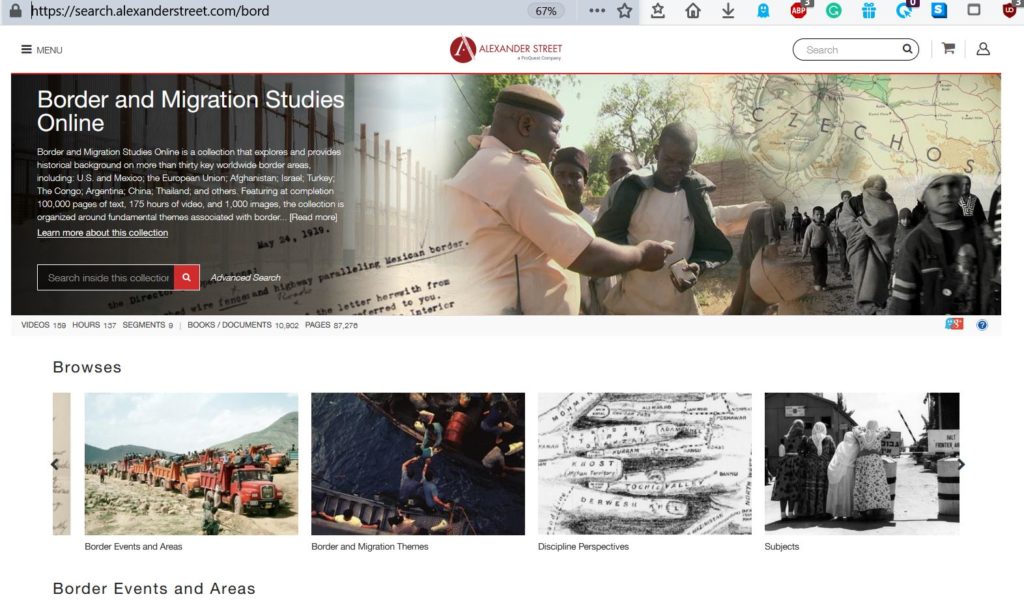 The landing page of the Border and Migration Studies Online.
The landing page of the Border and Migration Studies Online.
The images here are posted for fair academic use only and the copyright for the images belongs to Alexander Street (Proquest).
According to the self-description, the database provides historical context and resources, representing both personal and institutional perspectives, for the growing fields of border(land) studies and migration studies, as well as history, law, politics, diplomacy, area and global studies, anthropology, medicine, the arts, and more. At completion, the collection will include 100,000 pages of text, 175 hours of video, and 1,000 images.
This database is an essential tool to those who provide reference to several area studies related questions. One can find information on what is covered here: https://search.alexanderstreet.com/bord/about
The geographic areas that are covered are in the image below.
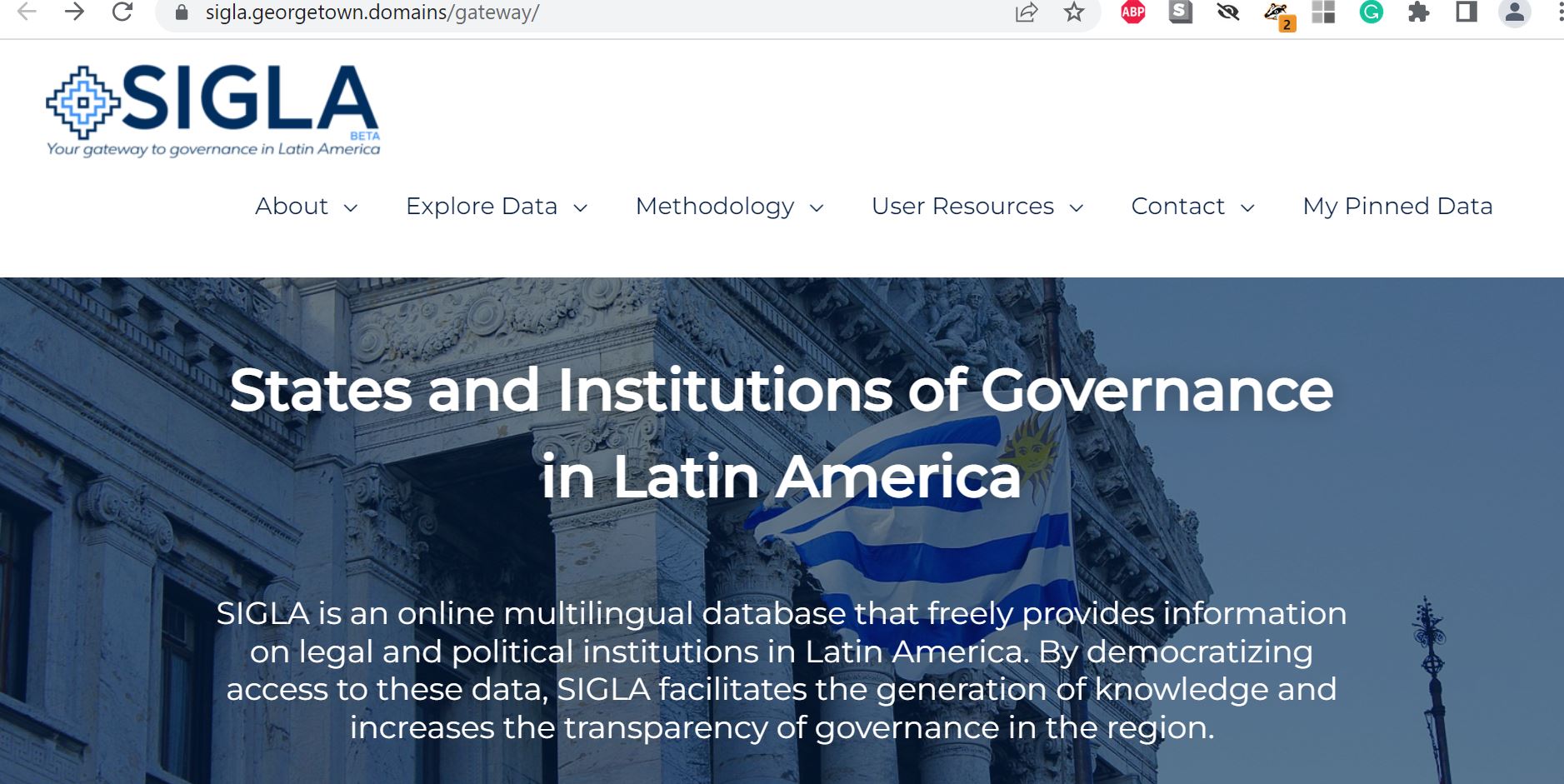
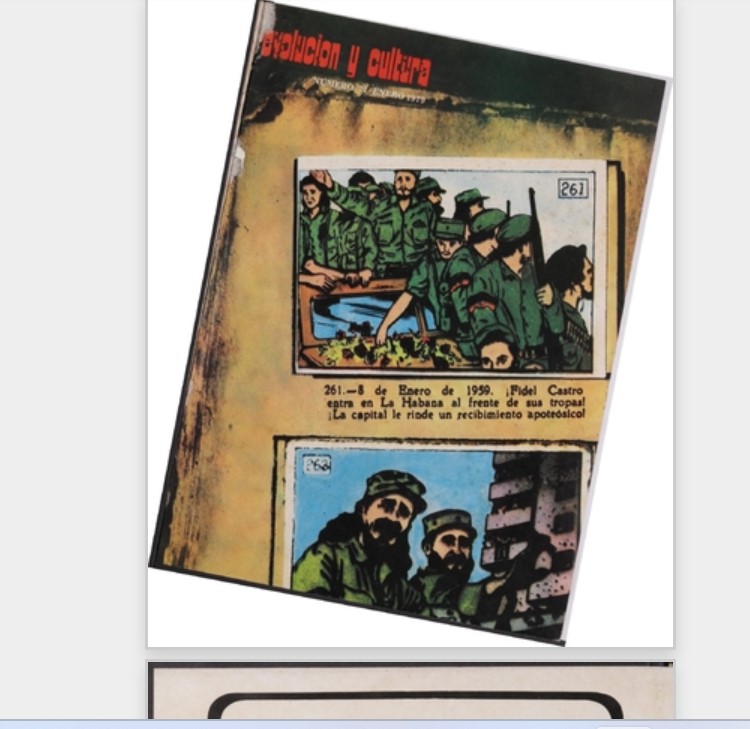
![[book cover]](https://update.lib.berkeley.edu/wp-content/uploads/2022/06/tarica.png)

